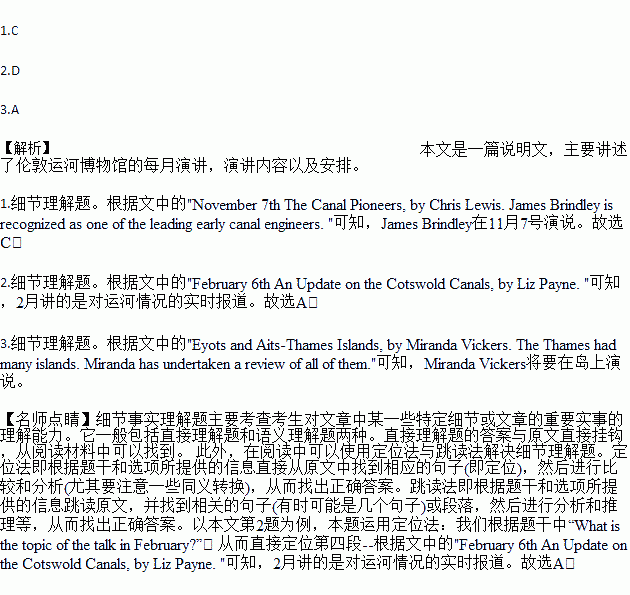题目内容
Monthly Talks at London Canal Museum
Our monthly talks start at 19:30 on the first Thursday of each month except August. Admission is at normal charges and you don’t need to book. They end around 21:00.
November 7th
The Canal Pioneers, by Chris Lewis. James Brindley is recognized as one of the leading early canal engineers. He was also a major player in training others in the art of canal planning and building. Chris Lewis will explain how Brindley made such a positive contribution to the education of that group of early “civil engineers”.
December 5th
Ice for the Metropolis, by Malcolm Tucker. Well before the arrival of freezers, there was a demand for ice for food preservation and catering, Malcolm will explain the history of importing natural ice and the technology of building ice wells, and how London’s ice trade grew.
February 6th
An Update on the Cotsword Canals, by Liz Payne. The Stroudwater Canal is moving towards reopening. The Thames and Severn Canal will take a little longer. We will have a report on the present state of play.
March 6th
Eyots and Aits-Thames Islands, by Miranda Vickers. The Thames had many islands. Miranda has undertaken a review of all of them. She will tell us about those of greatest interest.
Online bookings:www.canalmuseum.org.uk/book
More into:www.canalmuseum.org.uk/whatson
London Canal Museum
12-13 New Wharf Road, London NI 9RT
www.canalmuseum.org.uk www.canalmuseum.mobi
Tel:020 77130836
1.When is the talk on James Brindley?
A. February 6th. B. December 5th.
C. November 7th. D. March 6th.
2.What is the topic of the talk in February?
A. The Canal Pioneers. B. An Update on the Cotsword Canals
C. Eyots and Aits-Thames Islands D. Ice for the Metropolis
3.Who will give the talk on the islands in the Thames.
A. Miranda Vickers B. Malcolm Tucker
C. Chris Lewis D. Liz Payne
LOST AND FOUND | ROOMMATES |
FOUND: Cal, 6 months old, black and white marking. Found near Linden and South U. Steve, 800-4661. | FEMALE ROOMMATE WANTING Own room near campus. Available December 1. Rent $ 80 per month until March 1. $ 129 Thereafter. Call Jill for details. 800-7839 |
LOST: Gold wire rim glasses in brown case. Campus area. Reward. Call Gregg 800-2896 | Need person to assume lease for own bedroom in apt. Near campus, $ 92/mo. Starling Jan. 1. Call 800-6157 after 5 pm |
FOR SALE | HELP WANTED |
MOVING: Must sell. TV b/w 12, $ 50; AM/FM transistor radio A/C or battery, %15; cassette tape recorder, $ 10; music records, Call John or Pat, 800-0739 after 5 pm or weekends | BABYSITTER—MY HOME If you are available a few hours during the day, some evenings and occasional weekends to care for 2 school-age children, please call Gayle Moore days at 800-1111,evenings and weekends at 800-4964 |
USED FUR COATS and JACKETS Good condition. $ 50- $ 125. Cull 800-0436 after 12 noon | WAITRESS WANTED: 10 am-2 pm or 10: 30 am-5 pm. Apply in person, 207S. Main Curtis Restaurant |
1.What was lost in campus area according to the LOST AND FOUND ads?
A. A cat. B. A radio.
C. A cassette tape recorder. D. A pair of glasses.
2.You will have to call if you want to buy a radio.
A. 800-0436 B. 800-0739
C. 800-4964 D. 800-4661
3.Which of the following ads will you answer if you want a job of taking care of children?
A. LOST AND FOUND B. ROOMMATES
C. HELP WANTED D. FOR SALE

